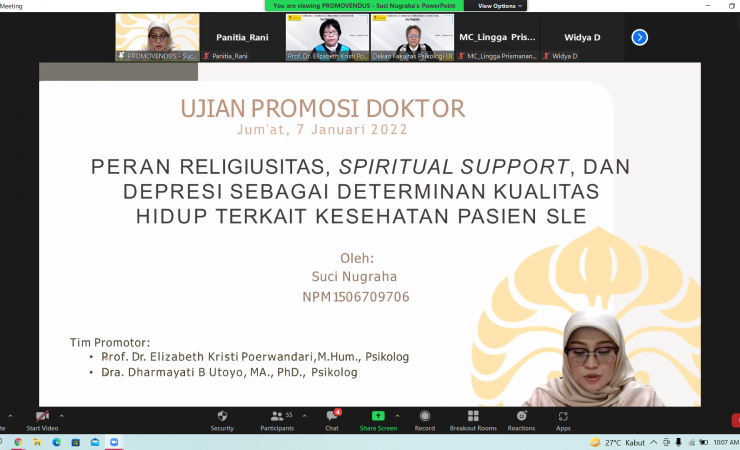Depok, January 25, 2022. In Indonesia, the exact number of people with lupus cannot be known. The increasing number of lupus cases needs to be watched out by the public by paying special attention because the diagnosis of lupus is not easy and often too late.
Systemic Lupus Erythematosus (SLE), also known as the “thousand faces” disease, is a chronic autoimmune inflammatory disease of unknown cause, and has a wide distribution of clinical features and a diverse course of disease. This causes frequent errors in recognizing lupus disease, causing delays in diagnosis and case management (Center for Data and Information, Ministry of Health of the Republic of Indonesia, 2017).
With the improvement of treatment technology, the morbidity rate of SLE tends to decrease, but the quality of life of SLE patients still shows a low value. The patient’s assessment of the aspects of his life that are affected by the disease and the treatment procedures undertaken (health-related quality of life) determine the level of well-being and life satisfaction of SLE patients.
“Patients’ assessment of their quality of life is very important so that patients feel well even though they are sick. Health-related quality of life is influenced by the cultural context in which the patient lives. The quality of life model related to the health of SLE patients tends to pay less attention to cultural factors, especially for SLE patients who live in a culture influenced by religion like Indonesia,” said Suci Nugraha when presenting her dissertation entitled “The Role of Religiosity, Spiritual Support and Depression as Determinants of Quality of Life Related to Health. SLE patients”, at the open session of doctoral promotion organized by the Doctoral Study Program, Faculty of Psychology, University of Indonesia (F.Psi UI) on Friday (7/1/2022).
The purpose of the research conducted by Suci is to explore a model of quality of life related to the health of SLE patients living in the context of Indonesian culture, and to test the suitability of the theoretical model with empirical data. This study used a mixed-methods exploratory sequential design research method which was carried out in two stages of research.
In the first stage, which is a qualitative research using Focus Group Discussion (FGD) technique, Suci explores health-related quality of life from the patient’s perspective. “The results of the study found themes regarding changes in various aspects of patients’ lives. What makes it difficult for them to fulfill their daily functions and roles, such as feelings of sadness, depression and fear, belief in God’s help, and support from family and friends,” he said.
The second stage is to build a model based on the results of the first study, namely a psychosocial model that explores the role of religion in shaping the quality of life related to the health of SLE patients who live in the context of Indonesian culture. “Religion is an inseparable variable of Indonesian culture that contributes consistently in shaping mental health. The role of religion in the model built is measured through religiosity and spiritual support,” Suci said.
In the second study, the model that was tested was to explain the mechanism of the relationship between religiosity, spiritual support, and depression on the quality of life of SLE patients. Result of analysis with
The structural equation model of 328 research subjects recruited by convenience sampling revealed that the theoretical model of quality of life related to the health of SLE patients, was in accordance with empirical data. In this model, it is explained that religiosity has a direct and indirect effect on the quality of life related to the health of SLE patients.
“The indirect relationship between religiosity and health-related quality of life occurs through several pathways, namely religiosity affects depression and then depression affects health-related quality of life. Meanwhile, spiritual support is a moderating variable that affects the strength of the relationship between religiosity and depression,” said the psychology consultant at the Integrated Psychology Service Unit at the Islamic University of Bandung and a psychologist who observes lupus.
The doctoral promotion session was chaired by the Dean of F.Psi Dr. Bagus Takwin, M. Hum., Psychologist, with supervisor, Prof. Dr. Elizabeth Kristi Poerwandari, M. Hum., as the Promoter, and Dra. Dharmayati B. Utoyo, MA., PhD., as Co-Promoter. The Examining Team in the trial were Prof. Dr. Guritnaningsih, Psychologist (chief examiner), Dr. Octaviani Indrasari Ranakusuma, M.Sc., Psychologist, Dr. Adriana Soekandar, M.S., Psychologist, Sali Rahadi Asih, M.Psi., MGPCC., Ph.D., Psychologist, and Dr. Dewi Maulina, M. Psi., Psychologist.
Source: UI PRESS RELEASE
Depok, January 25, 2022


